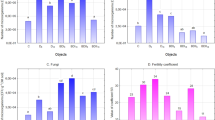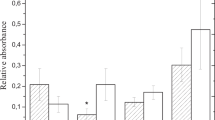Abstract
Biodiesel is a mixture of fatty acid methyl esters (FAME) from either vegetable oils or animal fats. Although biodiesel biodegrades faster than diesel fuel, the impacts of this biofuel in environment throughout its biodegradation process should be investigated. For this reason, the objective of the present study was to evaluate the microbial activity, the phytotoxicity, and the formation of metabolites during biodegradation of the contaminated soil with biodiesel. Microbial activity was evaluated using culture-dependent methods in soil samples artificially contaminated with biodiesel—followed by pH adjustments. The formation of metabolites during biodegradation was identified using gas chromatography coupled with mass spectrometry (GC/MS). Respirometric method was also applied to evaluate total microbial activity. Seeds of Cucumis sativus were sown in soil samples before and after biodegradation to expand our knowledge on the impacts of such metabolites in a eukaryotic test-organism. Culture-dependent assays successfully allowed the quantification of microorganisms during biodegradation. According to CO2 production, biodiesel initially acted as a biostimulation agent increasing microbial activity. Indigenous microbiota degraded biodiesel into smaller compounds such as pentane, free fatty acids, and methanol. Soil pH significantly dropped from 5.4 to 3.0 after 120 days of biodegradation as a result of high concentration of free fatty acids. These free fatty acids inhibited further microbial growth after biodegradation. It was proposed that correcting soil acidity during biodegradation would be enough to sustain microbial growth. However, pH decrease was just one of the factors that inhibited microbial growth and plant root development. It was proposed that biodegradation yielded toxic metabolites such as methanol. These metabolites contributed to impair the root elongation due to alcohol-specific properties to solubilize a wide variety of lipids within the seed. Therefore, the present study draws attention to metabolites from biodegradation of biodiesel and their potentially harmful environmental impacts.
Biodegradation of biodiesel changes soil pH, as it generates metabolites that are phytotoxic, and reduces microbial counts (CFU g−1 dry soil).




Similar content being viewed by others
References
Abioye, P. O., Abdul Aziz, A., & Agamuthu, P. (2010). Enhanced biodegradation of used engine oil in soil amended with organic wastes. Water, Air, and Soil Pollution, 209, 173–179. https://doi.org/10.1007/s11270-009-0189-3.
ANP - National Agency for Petroleum, Natural Gas and Biofuels. Resolution ANP n 45: 2014. Available in: http://legislacao.anp.gov.br/?path=legislacao-anp/resol-anp/2012/dezembro&item=ranp-45%2D%2D2012.
ASTM D6751-02. (2002). Standard specification for biodiesel fuel (B100) blend stock for distillate fuels. West Conshohocken: ASTM International.
Bamgbose, I. A., & Anderson, T. A. (2015). Ecotoxicology and environmental safety phytotoxicity of three plant-based biodiesels, unmodified castor oil, and diesel fuel to alfalfa (Medicago sativa L), lettuce (Lactuca sativa L.), radish (Raphanus sativus), and wheatgrass (Triticum aesti.). Ecotoxicology and Environmental Safety, 122, 268–274. https://doi.org/10.1016/j.ecoenv.2015.08.003.
Bamgbose, I. A., & Anderson, T. A. (2017). Assessment of three plant-based biodiesels using a daphnia magna bioassay. Environemental Science and Pollution Research, 25, 4506–4515. https://doi.org/10.1007/s11356-017-0678-7.
Bamgbose, I. A., & Anderson, T. A. (2020). Ecotoxicity of three plant-based biodiesels and diesel using, Eisenia fetida. Environmental Pollution, 260, 113965. https://doi.org/10.1016/j.envpol.2020.113965.
CEN - European Committee for Standardization. (2003). EN 14110: fat and oil derivatives – fatty acid methyl esters (FAME) - determination of methanol content - requirements and test. Methods. CEN.
CEN - European Committee for Standardization. (2012) EN 14214 automotive fuels - fatty acid methyl esters (FAME) for diesel engines – requirements and test. Methods. Brussels (Belgium): CEN.
Chistoserdova, L., Kalyuzhnaya, M. G., & Lidstrom, M. E. (2009). The expanding world of methylotrophic metabolism. Annual Review of Microbiology, 63, 477–499. https://doi.org/10.1146/annurev.micro.091208.073600.
Christie, W. W. (1993). Advances in lipid methodology – two (pp. 195–213). Dundee: Oily Press.
Chumsantea, S., Aryusuk, K., Lilitchan, S., Jeyashoke, N., & Krisnangkura, K. (2012). Reducing oil losses in alkali refining. Journal of the American Oil Chemists' Society, 89, 1913–1919. https://doi.org/10.1007/s11746-012-2079-x.
Colla, T. S., Andreazza, R., Bücker, F., de Souza, M. M., Tramontini, L., Prado, G. R., & Bento, F. M. (2014). Bioremediation assessment of diesel–biodiesel-contaminated soil using an alternative bioaugmentation strategy. Environemental Science and Pollution Research, 21, 2592–2602.
Cruz, J. M., Lopes, P. R. M., Montagnolli, R. N., Tamada, I. S., Silva, N. M. M. G., & Bidoia, E. D. (2013). Phytotoxicity of soil contaminated with petroleum derivatives and biodiesel. Ecotoxicology and Environmental Contamination, 8, 49–54. https://doi.org/10.5132/eec.2013.01.007.
Cruz, J. M., Tamada, I. S., Lopes, P. R. M., Montagnolli, R. N., & Bidoia, E. D. (2014). Biodegradation and phytotoxicity of biodiesel, diesel, and petroleum in soil. Water, Air, and Soil Pollution, 225, 1962. https://doi.org/10.1007/s11270-014-1962-5.
Da Cruz, A. C. S., Leite, M. B. N. L., Rodrigues, L. E. A., & Nascimento, I. A. (2012). Estimation of biodiesel cytotoxicity by using acid phosphatase as a biomarker of lysosomal integrity. Bulletin of Environmental Contamination and Toxicology, 89, 219–224. https://doi.org/10.1007/s00128-012-0707-7.
Eck-Varanka, B., Kováts, N., Horváth, E., Ferincz, Á., Kakasi, B., Nagy, S. T., Imree, K., & Paulovits, G. (2018). Eco-and genotoxicity profiling of a rapeseed biodiesel using a battery of bioassays. Ecotoxicology and Environmental Safety, 151, 170–177.
EPA. (2004). United States Environmental Protection Agency - Method 9045D: soil and waste pH, part of test methods for evaluating solid waste, physical/chemical methods. https://www.epa.gov/sites/production/files/2015-12/documents/9045d.pdf.
Fazal, M. A., Haseeb, A. S. M. A., & Masjuki, H. H. (2013). Corrosion mechanism of copper in palm biodiesel. Corrosion Science, 67, 50–59. https://doi.org/10.1016/j.corsci.2012.10.006.
Fedosov, S. N., Brask, J., & Xu, X. (2011). Analysis of biodiesel conversion using thin layer chromatography and nonlinear calibration curves. Journal of Chromatography. A, 1218, 2785–2792. https://doi.org/10.1016/j.chroma.2011.01.067.
Hawrot-Paw, M., & Martynus, M. (2011). The influence of diesel fuel and biodiesel on soil microbial biomass. Polish Journal of Environmental Studies, 20, 503–507.
Ivanoiu, A., Schmidt, A., Peter, F., Rusnac, L. M., & Ungurean, M. (2011). Comparative study on biodiesel synthesis from different vegetables oils. Chemical Bulletin of Politehnica University, 56, 94–98.
Leite, M. B. N. L., de Araújo, M. M. S., Nascimento, I. A., da Cruz, A. C. S., Pereira, S. A., & do Nascimento, N. C. (2011). Toxicity of water-soluble fractions of biodiesel fuels derived from castor oil, palm oil, and waste cooking oil. Environmental Toxicology and Chemistry, 30, 893–897. https://doi.org/10.1002/etc.444.
Leme, D. M., Grummt, T., de Oliveira, D. P., Sehr, A., Renz, S., Reinel, S., Ferraz, E. R. A., de Marchi, M. R. R., Machado, M. C., Zocolo, G. J., & Marin-Morales, M. A. (2012a). Genotoxicity assessment of water soluble fractions of biodiesel and its diesel blends using the Salmonella assay and the in vitro MicroFlow Ò kit (Litron) assay. Chemosphere, 86, 512–520. https://doi.org/10.1016/j.chemosphere.2011.10.017.
Leme, D. M., Grummt, T., Heinze, R., Sehr, A., Renz, S., Reinel, S., de Oliveira, D. P., Ferraz, E. R. A., de Marchi, M. R. R., Machado, M. C., Zocolo, G. J., & Marin-Morales, M. A. (2012b). An overview of biodiesel soil pollution: data based on cytotoxicity and genotoxicity assessments. Journal of Hazardous Materials, 199–200, 343–349. https://doi.org/10.1016/j.jhazmat.2011.11.026.
Ma, F., & Hanna, M. (1999). Biodiesel production: a review. Bioresource Technology, 70, 1–15. https://doi.org/10.1016/S0960-8524(99)00025-5.
Mylavarapu, R., Bergeron, J., & Wilknson, N. (1993). Soil pH and electrical conductivity: a county extension soil laboratory manual. Gainesville: University of Florida Institute of Food and Agricultural Sciences https://edis.ifas.ufl.edu/pdffiles/SS/SS11800.pdf.
Pikula, K. S., Zakharenko, A. M., Chaika, V. V., Stratidakis, A. K., Kokkinakis, M., Waissi, G., Rakitskii, V. N., Sarigiannis, D. A., Hayes, A. W., Colemanh, M. D., Tsatsakis, A., & Golokhvast, K. S. (2019). Toxicity bioassay of waste cooking oil-based biodiesel on marine microalgae. Toxicology Reports, 6, 111–117. https://doi.org/10.1016/j.toxrep.2018.12.007.
Pohl, C. H., Kock, J. L. F., & Thibane, V. S. (2011). Antifungal free fatty acids: a review. In A. Méndez-Vilas (Ed.), Science against microbial pathogens: communicating current research and technological advances (pp. 61–71). Spain: Formatex.
Pullen, J., & Saeed, K. (2012). An overview of biodiesel oxidation stability. Renewable and Sustainable Energy Reviews, 16, 5924–5950. https://doi.org/10.1016/j.rser.2012.06.024.
Ramos, M. J., Fernández, C. M., Casas, A., Rodríguez, L., & Pérez, Á. (2009). Influence of fatty acid composition of raw materials on biodiesel properties. Bioresource Technology, 100, 261–268. https://doi.org/10.1016/j.biortech.2008.06.039.
Schmitz, B., Ikner, L., Gerba, C., & Pepper, I. (2015). Culturing and enumerating bacteria from soil samples. JoVE https://10.3791/10099.
Schuchardt, U., Sercheli, R., & Vargas, R. M. (1998). Transesterification of vegetable oils: a review. Journal of the Brazilian Chemical Society, 9, 199–210.
Shahid, E. M., & Jamal, Y. (2011). Production of biodiesel: a technical review. Renewable and Sustainable Energy Reviews, 15, 4732–4745. https://doi.org/10.1016/j.rser.2011.07.079.
Silva, G. S., Marques, E. L. S., Dias, J. C. T., Lobo, I. P., Gross, E., Brendel, M., Da Cruz, R. S., & Rezende, R. P. (2012). Biodegradability of soy biodiesel in microcosm experiments using soil from the Atlantic Rain Forest. Applied Soil Ecology, 55, 27–35. https://doi.org/10.1016/j.apsoil.2012.01.001.
Silva, G. S., Rezende, R. P., Romano, C. C., Dias, J. C. T., Marques, E. L. S., Lobo, I. P., & da Cruz, R. S. (2019). An outlook on microbial behavior: mimicking a biodiesel (B100) spill in sandy loam soil. Fuel, 235, 589–584 https://10.1016/j.fuel.2018.08.056.
Stolz, J., Follis, P., Floro, G., Donofrio, R., Buzzelli, J., Griffin, W. (1995). Aerobic and anaerobic biodegradation of the methyl esterified fatty acids of soy diesel in freshwater and soil environments. https://biodiesel.org/reports/19950101_gen-273.pdf.
Strotmann, U., Reuschenbach, P., Schwarz, H., & Pagga, U. (2004). Development and evaluation of an online CO2 evolution test and a multicomponent biodegradation test system. Applied and Environmental Microbiology, 70, 4621–4628. https://doi.org/10.1128/AEM.70.8.4621-4628.2004.
Stutte, G. W., Eraso, I., Anderson, S., & Hickey, R. D. (2006). Bioactivity of volatile alcohols on the germination and growth of radish seedlings. HortScience, 41, 108–112.
Tamada, I. S., Montagnolli, R. N., Lopes, P. R. M., & Bidoia, E. D. (2012). Toxicological evaluation of vegetable oils and biodiesel in soil during the biodegradation process. Brazilian Journal of Microbiology, 43, 1576–1581. https://doi.org/10.1590/S1517-838220120004000042.
Thomas, A. O., Leahy, M. C., Smith, J. W. N., & Spence, M. J. (2017). Natural attenuation of fatty acid methyl esters (FAME) in soil and groundwater. Quarterly Journal of Engineering Geology & Hydrogeology. https://doi.org/10.1144/qjegh2016-130.
Valerio, O., Horvath, T., Pond, C., Misra, M., & Mohanty, A. (2015). Improved utilization of crude glycerol from biodiesel industries: Synthesis and characterization of sustainable biobased polyesters. Industrial Crops and Products, 78, 141–147. https://doi.org/10.1016/j.indcrop.2015.10.019.
Walters, D., Raynor, L., Mitchell, A., Walker, R., & Walker, K. (2004). Antifungal activities of four fatty acids against plant pathogenic fungi. Mycopathologia, 157, 87–90. https://doi.org/10.1023/B:MYCO.0000012222.68156.2c.
Warner, K., Evans, C. D., List, G. R., Boundy, B. K., & Kwolek, W. F. (1974). Pentane formation and rancidity in vegetable oils and in potato chips. Journal of Food Science, 39, 761–765. https://doi.org/10.1111/j.1365-2621.1974.tb17974.x.
Wu, S., Yassine, M. H., Suidan, T. M., & Venosa, A. D. (2016). Anaerobic biodegradation of soybean biodiesel and diesel blends under sulfate-reducing conditions. Chemosphere, 161, 382–389. https://doi.org/10.1016/j.chemosphere.2016.06.078.
Yang, F., Ke, Y., & Kuo, S. (2000). Effect of fatty acids on the mycelial growth and polysaccharide formation by Ganoderma lucidum in shake flask cultures. Enzyme and Microbial Technology, 27, 295–301. https://doi.org/10.1016/S0141-0229(00)00213-1.
Yassine, M. H., Wu, S., Suidan, M. T., & Venosa, A. D. (2013). Aerobic biodegradation kinetics and mineralization of six petrodiesel/soybean-biodiesel blends. Environmental Science & Technology, 47, 4619–4627. https://doi.org/10.1021/es400360v.
Zhou, J., Xiong, Y., Gong, Y., & Liu, X. (2017). Analysis of the oxidative degradation of biodiesel blends using FTIR, UV–Vis, TGA and TD-DES methods. Fuel, 202, 23–28. https://doi.org/10.1016/j.fuel.2017.04.032.
Funding
This study was financially supported by FAPESP (Grant number 2013/13813-0).
Author information
Authors and Affiliations
Corresponding author
Ethics declarations
Conflict of Interest
The authors declare that they have no conflict of interest.
Ethical Approval
All authors have declared this article does not contain any studies performed with human participants or animals.
Additional information
Publisher’s Note
Springer Nature remains neutral with regard to jurisdictional claims in published maps and institutional affiliations.
Highlights
• The biodiesel biodegradation generates methanol as metabolites.
• The metabolites from biodiesel biodegradation cause complete inhibition of seed germination and cultivable microorganisms.
• The buffering of the soil with soda lime granules reduced the methanol produced during biodegradation.
Electronic Supplementary Material
ESM 1
(DOCX 83 kb)
Rights and permissions
About this article
Cite this article
Cruz, J.M., Montagnolli, R.N. & Bidoia, E.D. Biodegradation of Soybean Biodiesel Generates Toxic Metabolites in Soil. Water Air Soil Pollut 231, 429 (2020). https://doi.org/10.1007/s11270-020-04801-w
Received:
Accepted:
Published:
DOI: https://doi.org/10.1007/s11270-020-04801-w




